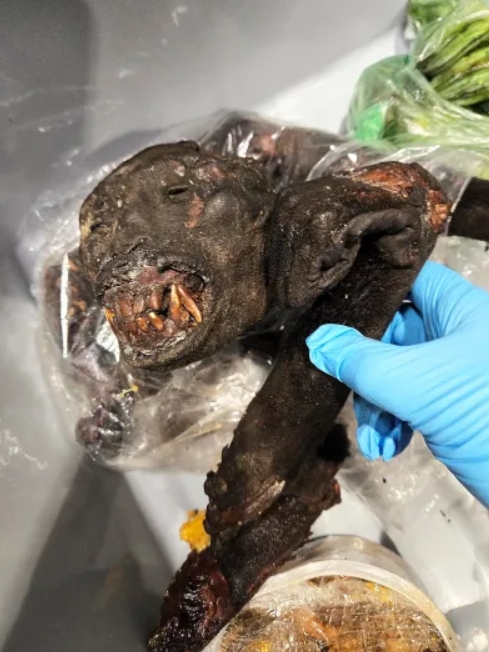
Posted on 08/27/2025 7:40:18 AM PDT by Red Badger
U.S. Customs and Border Protection officers intercepted two separate shipments of bushmeat at Detroit Metropolitan Airport last month, including one haul of primate meat, in seizures officials say highlight the dangers of disease entering the United States.
Bushmeat—defined by U.S. health agencies as meat from wild animals such as bats, monkeys, and cane rats—is illegal to import into the country.
CBPOps and DFODetroit announced the discoveries Saturday in a joint post on Instagram, writing, “Scary!!! @DFODetroit CBP agriculture specialists intercepted back-to-back bushmeat at @DTWShots. Bushmeat poses serious risks to public health and violates federal regulations. CBP remains vigilant in protecting our borders and communities. #OFOProud🇺🇸 #CBP #OFO #ProtectingAgriculture #NationalSecurity.”
According to a press release issued August 20, CBP agriculture specialists discovered 11 pounds of rodent meat from Togo in one baggage examination and 52 pounds of primate meat—declared as antelope—days later in luggage arriving from Gabon. Both travelers also carried undeclared agricultural items. The seized meat was turned over to the Centers for Disease Control and Prevention, and each passenger was fined $300 for failing to declare it.

CBP PHOTO – U.S. Customs and Border Protection agriculture specialists encountered potentially disease-ridden bushmeat twice within one week at Detroit Metropolitan Airport.
============================================================================
“These recent bushmeat interceptions are significant in bringing attention to the illegal importation of bushmeat through our ports of entry,” Port Director Fadia Pastilong said in the statement. “This also showcases how we work with our partner agencies to prevent a potential disease outbreak.”
A 2024 entry on the CDC website warns that bushmeat can carry pathogens, including orthoebolaviruses, the family of viruses that cause Ebola. Importing any amount of bushmeat can result in seizure and fines of up to $250,000. While the CDC notes there have been no reported cases of Americans contracting disease from confiscated bushmeat, it stresses that the risk is serious.
Researchers have long pointed to the dangers. A 2019 Penn State report found that bushmeat samples from the Serengeti contained bacteria linked to anthrax, brucellosis, and Q fever.
The International Fund for Animal Welfare said in 2022 that demand for bushmeat in cities and abroad, including in Europe and North America, fuels a global industry and threatens both biodiversity and human health. The group cited estimates that five tons of wild animal meat are smuggled through Paris’s Charles de Gaulle Airport each week.
Nevertheless, bushmeat is an essential element of West African diets. One study estimated that in some regions, bushmeat constitutes 80–90% of animal protein intake.
CBP officials in Detroit said that while rodent-type bushmeat is intercepted sporadically, primate meat seizures are rare. They cautioned that consumption of bushmeat in parts of Africa, where it is sometimes eaten raw or minimally processed, heightens the risk of diseases like Ebola and mpox spreading to new populations.
“We routinely find various agriculture items and oddities—live giant snails, animal skulls, and exotic food items—but most times it’s not a malicious act,” said Director of Field Operations Marty C. Raybon. “Despite this, it’s our duty to protect the homeland and preventing certain food and animal products from entering the U.S. is essential to public health.”
Mostly they are. I remember one radio talk-show host telling us his wife brought and orange back from Europe and they made her throw it away................
It would be nice to encourage these folks to consume more raccoon. There is one animal that would be very difficult to overhunt, and it would really benefit birds like quail and turkey if raccoon was hunted more intensively.
I have trapped 7 raccoons in the last month going after my chickens.....................
We have plenty of cane rats down in Florida, and invasive pythons and iguanas too...maybe encourage a market in those.
Yep, they are always up to no good.
Iguanas make for a good meal. Very tasty meat.
PETA ... did you mean People Eating Tasty Animals or the kook group?
Trump, man up, declare a National Security Emergency, and “pause” all immigration indefinitely.
“Nevertheless, bushmeat is an essential element of West African diets. One study estimated that in some regions, bushmeat constitutes 80–90% of animal protein intake”
Absolutely can confirm. Having worked in Congo and the DRC plus Gabon doing oil and hard rock geology mainly cobalt and gold. Every one eats bushmeat its is the norm not the outlier. Jo Berg even has markers where you see it , technically illegal but a blind eye is turned to it.
“Iguanas make for a good meal. Very tasty meat.”
Yes they do, in the Yucatan they make tamales out of them or mole or grill them and pull it like pork for tacos. Florida has such a problem with them they are trying to get people to hunt and eat them in Florida too.
That’s because in their homeland they can’t afford our kinds of meat.
Hey Jambo, you’re in America now. Food of all kinds is cheap.
Have some beef, chicken, turkey, pork or lamb! Maybe elk, moose, venison, duck, rabbit or squirrel if your so inclined to hunt for it with a proper license. No monkeys, no rats. Otherwise get out!
“Why isn’t PETA up in arms about this?”
Because...they’re...
...unarmed...?
Maybe?
Disclaimer: Opinions posted on Free Republic are those of the individual posters and do not necessarily represent the opinion of Free Republic or its management. All materials posted herein are protected by copyright law and the exemption for fair use of copyrighted works.